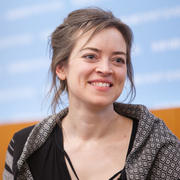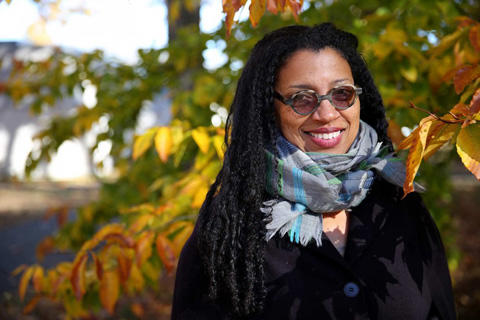
Before he became an award-winning poet and Episcopal priest, Spencer Reece, MTS ’90, attended Harvard Divinity School. He took classes on Flannery O’Connor, the Bible, and the nineteenth-century Transcendentalist writer, poet, and HDS student Ralph Waldo Emerson.
At a reading in spring 2016 at Harvard’s Houghton Library, award-winning poet and HDS alumna Robin Coste Lewis frequently referred to her time at HDS and the importance of professors like the late Rev. Peter Gomes and Diana Eck, for whom she worked as a research assistant.
C. E. Morgan, MDiv ’09, was still a student at HDS when she started writing her first novel, All the Living, about an orphaned woman who marries young and moves onto a farm in Kentucky.
Creative writers have been attending HDS for a long time, but why? What is the connection between writing poetry, novels, or memoir, and an institution dedicated to ministerial training and the scholarly study of religion?
The answers are as varied as the authors themselves. They may come to study theology, languages, or literature in their religious contexts, or to prepare themselves for various forms of service or ministry. Whatever their individual paths, at HDS, writers keep finding both inspiration and the tools they need for unorthodox careers, which often combine writing with other callings.
Coste Lewis, who won the National Book Award for Poetry in 2015 for her first book, Voyage of the Sable Venus, graduated in 1997 with an MTS degree in Sanskrit and comparative religious literature.
Explaining the genesis of a poem, titled “On the Road to Sri Bhuvaneshwari,” Lewis said, “Diana Eck recommended I go on a trip to India to teach a semester abroad program. This poem happened because of that trip.”
The poem reflects Lewis’s study of sacred literature, mixing memories of her time in India with a myth about the Hindu goddess Parvati, who jumped into a fire to prove her purity, after which her charred body fell to earth in pieces. Lewis turns the ancient story about a goddess into an occasion for reflecting on the human condition:
“perhaps
embodiment is so bewildering, even God grows
wracked with doubt.”
Lewis’s talent for putting different source materials to new uses is on display throughout Voyage of the Sable Venus, whose title poem is a collage of words repurposed from museum catalogs. Every phrase in the poem is drawn from the titles or descriptions of artworks depicting black female bodies from all of Western art history. Lewis turns prodigious amounts of archival research into a commentary on race and gender that feels simultaneously historical and personal.
During her time at HDS, Lewis not only gained scholarly training and opportunities for travel that eventually paid poetic dividends, but also experienced moments of personal revelation.
“The last time I was on campus was for the memorial service of Rev. Peter Gomes, who was my teacher and who hosted high tea at his house every Wednesday,” Lewis explained at her reading. “I, of course, like most divinity school students, eventually started to have a prolonged and dramatic existential crisis. And I remember going to tea one day after shaving my head, and Peter looked at me, and he asked, ‘Are you OK?’ ”
“I just looked at him and said, ‘Peter, do you have any idea what is going on?’ And he looked at me and said, ‘Not a clue, darling.’ But he said it with a tone of joy, as if to say, ‘And that’s the point.’ ”

Even if definitive answers are elusive, writing imaginatively about “what is going on” can help people find their way through the most difficult parts of life. The novelist Chris Adrian, MDiv ’11, came to HDS with an MD in pediatric oncology and an MFA in fiction, looking to ground himself in philosophical and theological thought about suffering.
Such a research interest might seem surprising, but it made sense for Adrian as a doctor who works with children affected by cancer. His novels, too, examine death and disease, but with the help of surrealism. The Children’s Hospital, for instance, is set in a medical facility that floats away when the world floods, becoming a new Noah’s Ark. The Great Night imagines a fairy queen and king adopting a human child who later contracts leukemia.
Asked how her time at HDS related to the writing of fiction, C.E. Morgan replied, “The best education mirrors the best books in that they both investigate the fundamental questions: Why are we here? How should we use our time? How do we limit suffering, our own and others’? How do we make meaning? An HDS education is a plunge into what matters most.”
Morgan’s recently published second novel, The Sport of Kings, takes on large topics like race, gender, and history through the lens of horse-racing. In startling, carefully hewn prose, Morgan's books pursue the "moral beauty" she said she came to HDS to learn about.
Unsurprisingly for a writer interested in thorny ethical questions, Morgan has also said that the earliest stories to impact her were the stories of the Old and New Testaments. HDS provides ample opportunities to study these and other sacred books from diverse traditions, like the Hindu myths that inspired Coste Lewis.
The importance of analyzing such texts, not only as philosophical or sacred documents, but as literature, was emphasized by HDS professor Mayra Rivera Rivera in a talk at the Mahindra Center for the Humanities in fall 2015.
“Getting at some of the most fascinating aspects of religious texts requires attention to their use of language,” Rivera said. “These texts seek to entice readers to see differently by putting to words what they deem ultimately inexpressible, making visible the invisible. For this they use stories, parables, poetry, and startling metaphors in attempts to push language to its limits. And thus the importance of literary approaches.”
Aspiring writers at HDS can also study more recent texts that are explicitly or imaginatively indebted to different spiritual traditions. This past spring semester, Rivera taught a course on Caribbean poetics, a genre that often uses religious language and images, and Professor David Carrasco taught the fiction of Toni Morrison and Gabriel Garcia Marquez, which he sees as sharing themes of apocalypse.
For the poet Spencer Reece, communing with his spiritual-literary ancestors is crucial. When he came to HDS, he wanted to be like George Herbert, the seventeenth-century Anglican priest and poet. Later, when Reece’s first book of poetry, The Clerk’s Tale, won the prestigious Bread Loaf Writers’ Conference Bakeless Prize, he decided to go on a pilgrimage to the Kentucky monastery where the Catholic monk and writer Thomas Merton had lived.
Reece treasured the time he had at HDS to study theology, sacred texts, and spiritual writers, though he jokes about living in a dormitory on Divinity Avenue.
“That street was one of the few dead ends in Cambridge, and that seemed rather ominous and humorous to me at the time.”
It proved to be anything but a dead end for Reece, though. His winding path has included divinity school, working in retail, publishing two volumes of poetry (The Clerk’s Tale and The Road to Emmaus), becoming an Episcopal priest, teaching creative writing at a girl’s orphanage in Honduras (the subject of a documentary called Las Chavas, of which James Franco is an executive producer), and his current position as chaplain to an Episcopal bishop in Madrid, Spain. His dream of becoming a poet-priest like George Herbert has been realized.
Of his twin vocations, Reece said, “Writing poetry and prose is very interior and, for the most part, solitary. Being a priest is about people, people, people. I think the two balance me out.”
Unlike Reece, current HDS student Kassi Underwood has long felt a calling to be a writer, but she only recently came to see how that profession might relate to ministry. For years, she has written creative nonfiction about her own life for publications like the New York Times, New York Daily News, and Al Jazeera America. Next year, HarperOne will publish her memoir, May Cause Love: My Humbling, Heartbreaking, Hugely Satisfying Search for Enlightenment After Abortion.
In the course of writing about very personal, sometimes controversial issues like abortion, addiction, and faith, Underwood found that readers would get in touch about their own struggles, sometimes putting her in a difficult position as a stranger’s only confidant.
“At first,” Underwood said, “I denied the need for formal preparation, but certain encounters shook me out of denial, like emails from pregnant girls who hadn’t told anyone but me and didn't know what to choose.”
She also realized that her identity could make it difficult to give advice to people who did not have the same experiences as she did.
“What healed me might harm another person. For example, as a white cis-woman, I can publish an essay about my abortion without experiencing racism or transphobia. The spiritual tool of storytelling that was so liberating for me could result in backlash for another person. So I’m here at HDS to become a responsible accidental minister.”
As Underwood continues her studies, she will be joining her story to those of Robin Coste Lewis, Chris Adrian, C. E. Morgan, Spencer Reece, and even Ralph Waldo Emerson: a tradition of poets, essayists, and novelists who came to HDS for different reasons, but who all found here what they needed.
—by Walter Smelt
